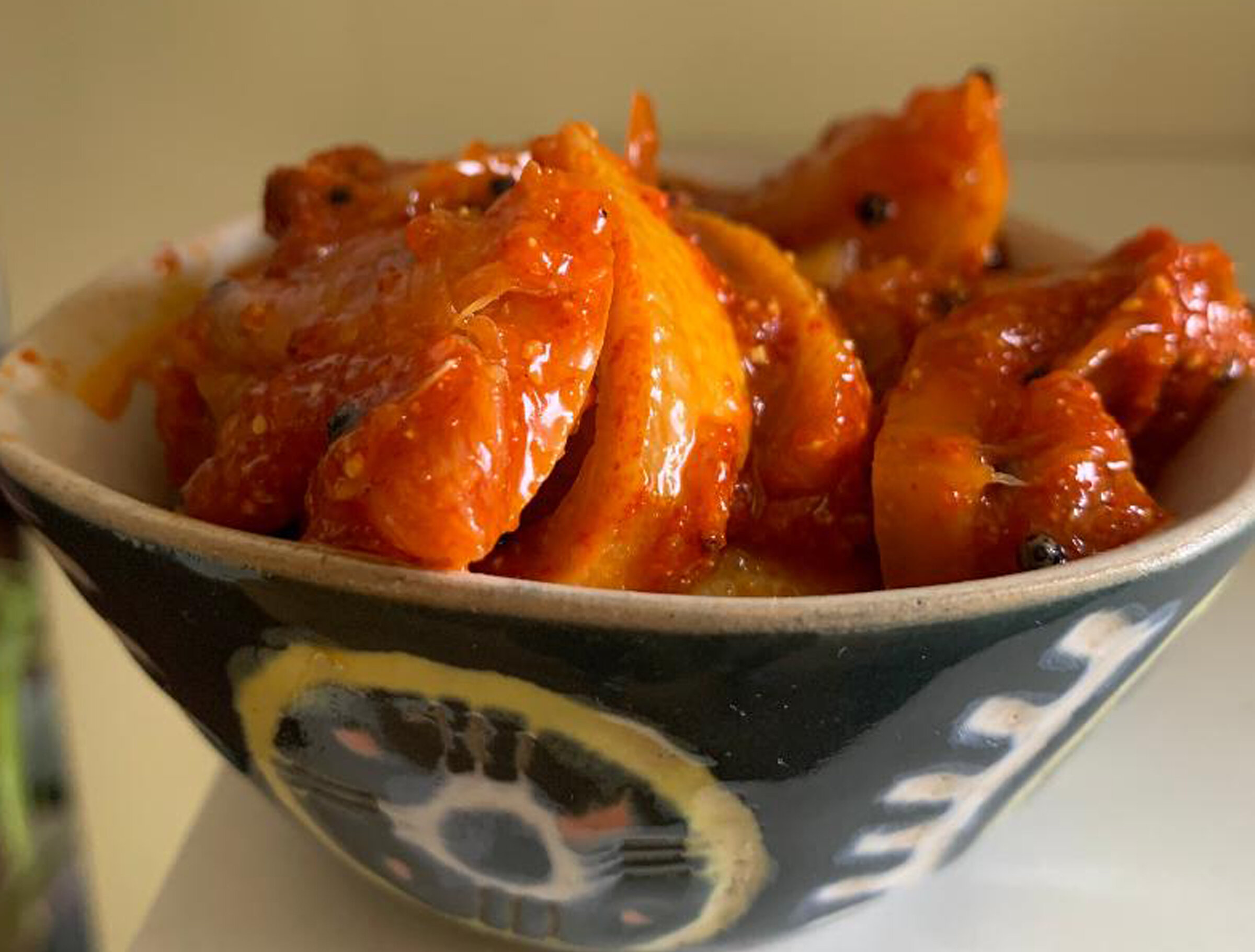TRUTH BE TOLD
THE JOYS OF MAKING ACHAAR (NOT TO MENTION CONSUMING IT)
Neebu ka achaar (lime pickle). Yum!
By DR VICKI BISMILLA
During the lockdown, technology connected friends. I have far-away, childhood friends, Laila and Rashida with whom I have a “sisters from other mothers” relationship.
We text-chat each day and one day Laila sent a recipe from her friend Razea, who went to university with us and who, to honour her aunt, calls it “Aunty Amina’s easy-peasy lemon achaar”.
Boil three washed lemons for five minutes with salt. Drain and cool. Cut into small pieces in a dish making sure all the juices are collected. Add chilli powder, salt to taste, peppercorns, and cloves. Mix and bottle. Next day add vinegar to cover contents. Add a little sugar if you like.
Because I can no longer eat chilli powder, I substituted paprika, haldi and dried pudhina flakes. So easy, so delicious! Try it!
We then reminisced about how our mothers made achaar sixty years ago.
Rash lived in an apartment on a busy Durban street during her childhood. She remembers, the mango season had the whole family cutting mangoes, some peeled, then dried on the roof garden of the building before the addition of spices. “I was nowhere to be found whenever kitchen stuff was involved. But the Gujarati girls next door were so good, so deft and helpful. Those mangoes metamorphosed into six different delicious achaars. I liked the ‘goriyas’ (gor keri) best. They were sweet and sour, soaked in gor or jaggery and spiced up.”
Laila remembered achaar-making season at her grandmother’s house. “In the small town the lemons, red chilies and mangoes were dried on the roofs of the chicken coop. Those dried lemon slices covered in salt and chilli powder were mouth watering. I love achaar. Khuri kitchri has to have lemon achaar and chicken curry is useless without mango achaar.”
Jars of Laila’s achaar.
I remembered my mother’s lemon tree overhanging our verandah. It was the most amazing lemon tree I have ever seen and the lemons, with their thick rinds were delicious. As children we plucked and ate them with salt and chilli powder, rind and all.
My sister Uma and I reminisced about mango achaar season in our childhood home. Our parents and we siblings plucked the mangoes from our orchards, cleaned and cut them in the backyard. We dried them for three days on paper-lined tables on the verandah and back porch, covered with newspaper so birds couldn’t do a flyover poop.
Some pieces of course disappeared into tiny hands and mouths while drying but I am not telling whose!
Our mother pan-roasted methi, sarson, ajwain, golmirch and dried red chillies then ground them all in her large stone mortar and pestle. She then heated mustard oil and added to the dry ingredients. She mixed the dried mangoes, ground masala and additional oil. She put the achaar into big ceramic jars. Those sat in the pantry for several days with Ma checking often to see if more oil was needed. The aroma from the pantry was inviting, but no small hands could tackle those tight cork lids.
These discussions brought longing memories of childhood.
Laila has handwritten recipes from her late mother but notes such as “add a bottle of oil,” need trial and error to figure out today. Rash says, “What I remember with absolute clarity is the wonderful old lady next door whom we called Maahi. We would sneak up to steal her drying mangoes and she would chase us shouting, ‘Saali! Different! One by one!’ Apparently she thought these were English swear words. But she had a heart of gold. When the achaars were ready, every flat received several bowls of each variety.” And when the young girls got to university Maahi, holding up a broom, chased away any young suitors visiting the building. But when the young man whom Rash later married visited, Maahi gushed and approved!
Also, our school-days’ love of figs was awakened for Rash recently when a tour driver in Jordan stopped to pick fresh, sweet figs from branches overhanging a sidewalk.
She and her nieces were apprehensive until a dignified, elderly gentleman came out of the gate and gave them a dish in which to collect their delicious loot from his abundant tree.
They shared the figs with children on rural roads through which they drove.
Recollections of childhood, be they of sweet goolgoolas or tangy achaars, warm parental hugs or stern protectiveness, are all stored in our hearts and minds.
Memories are made of this.
Dr Vicki Bismilla is a retired Superintendent of Schools and retired college Vice-President, Academic, and Chief Learning Officer. She has authored two books.



